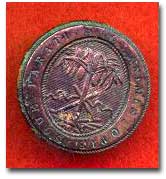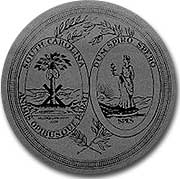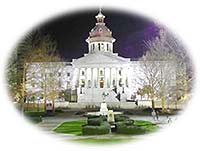24c. The South Carolina Nullification Controversy

The Governor of South Carolina bought buttons like this one as a symbol of defiance to the U.S. government.
By the late 1820's, the north was becoming increasingly industrialized, and the south was remaining predominately agricultural.
In 1828, Congress passed a high protective tariff that infuriated the southern states because they felt it only benefited the industrialized north. For example, a high tariff on imports increased the cost of British textiles. This tariff benefited American producers of cloth — mostly in the north. But it shrunk English demand for southern raw cotton and increased the final cost of finished goods to American buyers. The southerners looked to Vice President John C. Calhoun from South Carolina for leadership against what they labeled the "Tariff of Abominations."

The Ordinance of Nullification issued by South Carolina in 1832 foreshadowed the state's announcement of secession nearly 30 years later.
Calhoun had supported the Tariff of 1816, but he realized that if he were to have a political future in South Carolina, he would need to rethink his position. Some felt that this issue was reason enough for dissolution of the Union. Calhoun argued for a less drastic solution — the doctrine of "nullification." According to Calhoun, the federal government only existed at the will of the states. Therefore, if a state found a federal law unconstitutional and detrimental to its sovereign interests, it would have the right to "nullify" that law within its borders. Calhoun advanced the position that a state could declare a national law void.

The members of the South Carolina legislature defended the rights of the states against the federal government.
In 1832, Henry Clay pushed through Congress a new tariff bill, with lower rates than the Tariff of Abominations, but still too high for the southerners. A majority of states-rights proponents had won the South Carolina State House in the recent 1832 election and their reaction was swift. The South Carolina Ordinance of Nullification was enacted into law on November 24, 1832. As far as South Carolina was concerned, there was no tariff. A line had been drawn. Would President Jackson dare to cross it?
Jackson rightly regarded this states-rights challenge as so serious that he asked Congress to enact legislation permitting him to use federal troops to enforce federal laws in the face of nullification. Fortunately, an armed confrontation was avoided when Congress, led by the efforts of Henry Clay, revised the tariff with a compromise bill. This permitted the South Carolinians to back down without "losing face."
In retrospect, Jackson's strong, decisive support for the Union was one of the great moments of his Presidency. If nullification had been successful, could secession have been far behind?






